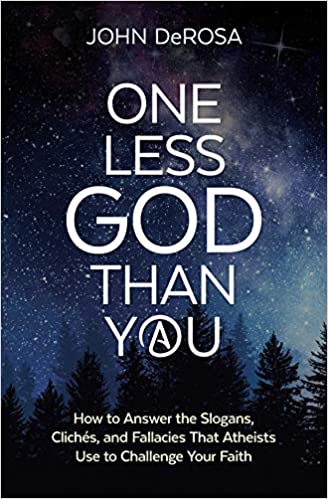One Less God Than You: How to Answer the Slogans, Clichès, and Fallacies That Atheists Use to Challenge Your Faith is a fairly recent book by John DeRosa.
I first came to know about John DeRosa on Twitter and became interested enough in what he had to say on the subject of Classical Theism to subscribe to his podcast. I really enjoy his podcast, which covers topics from philosophy, theology, to scripture. He has many great guests on, and I will need to listen to the whole of his archive of shows.
So I picked up this book, figuring it would be something I would enjoy. It really delivers on its subtitle. I liked pretty much everything regarding the approach this book takes. For one, it starts right by concentrating on prayer as a priority first before engaging in dialogue with atheists. The next is that it is presented in a listen-reason-propose framework. A form of Socratic dialogue is used, which avoids confrontational approaches. Some Catholic books about talking with atheists often come off as aggressive. Or present a view of atheists purposely denying God even though they “Know he exists.”
Each chapter of the book deals with a common atheist slogan you are likely to hear. He suggests some pathways in discussing the topic. As his framework suggests, the key is listening to the person to find out what they think on a topic and how they frame an objection. The temptation is to jump right in with an answer as soon as you see the general direction it seems to be aiming. Providing examples and principles to “reveal important truths about the topic under discussion.” This can be followed up by asking questions to clarify and proposing arguments and pieces of evidence. Plus it is always important to define things as you go. Ask how they define something and be clear on your own definitions. Otherwise, it is way to easy to talk past each other.
The chapters provide some possible responses, questions to ask what you might propose. Some topics include what he calls middlegame responses to advance the conversation. What he provides is not meant to be a script, but just some starting points that you can use and build upon with your own approaches and responses. Also offered are references for future study to go deeper into a specific topic.
I really enjoyed the tone of this book and how he thought through the various topics. This is a very accessible book for a general audience. Besides, how he explains this framework is valuable for any discussions.

